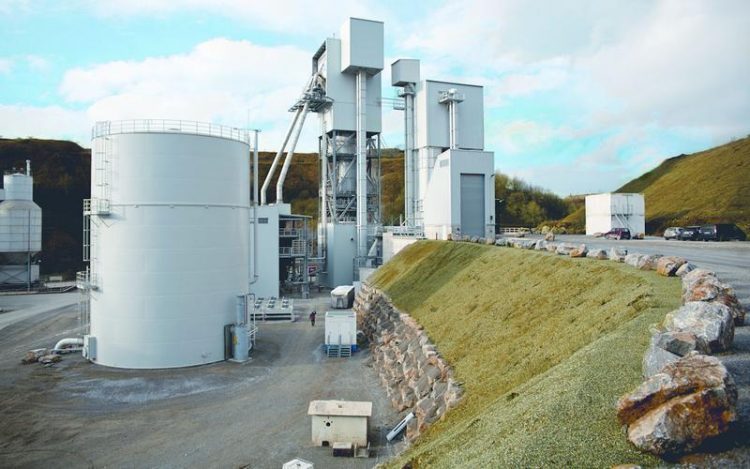Converting waste plastics into gas

View of the Ecoloop large scale pilot plant. In this shaft kiln plant, 50,000 tons of waste plastic can be processed per year. © Ecoloop GmbH
New method utilises carbon-containing sorting residues and waste
With this method, the residual materials are mixed with coarse-ground lime and, using the counter flow principle, converted thermally and chemically in several stages, including gasification and pyrolysis.
The lime is used as a carrier medium for the plastics, as a catalyst for the process and as a binder for pollutants. No flue gas emissions are produced during the conversion.
The method is also suitable for problematic waste such as chlorine-containing plastics, contaminated soils and plastic-containing electrical scrap. Lime binds not only halogens and other harmful substances but also valuable materials contained in waste materials such as metals from electrical scrap.
These can later be separated and recycled. The new procedure is designed to supplement existing waste treatment systems.
The process produces a purified synthesis gas that can be utilised materially for producing basic chemical products or in engines. The first large-scale plant can recycle up to 50,000 tonnes of waste plastic per year. Ecoloop GmbH in Bad Harzburg, Germany, has developed the Ecoloop method in collaboration with other partners.
You found all informations about the BINE Projektinfo brochure entitled “Generating syngas from plastic wastes” (05/2016) here:
http://www.bine.info/en/press/press-releases/press/pressemitteilung/altkunststof…
Uwe Milles/Birgit Schneider
presse(at)bine.info
About BINE Information Service
Energy research for practical applications
The BINE Information Service reports on energy research topics, such as new materials, systems and components, as well as innovative concepts and methods. The knowledge gained is incorporated into the implementation of new technologies in practice, because first-rate information provides a basis for pioneering decisions, whether in the planning of energy-optimised buildings, increasing the efficiency of industrial processes, or integrating renewable energy sources into existing systems.
About FIZ Karlsruhe
FIZ Karlsruhe – Leibniz Institute for Information Infrastructure is a not-for-profit organization with the public mission to make sci-tech information from all over the world publicly available and to provide related services in order to support the national and international transfer of knowledge and the promotion of innovation.
Our business areas:
• STN International – the world’s leading online service for research and patent information in science and technology
• KnowEsis – innovative eScience solutions to support the process of research in all its stages, and throughout all scientific disciplines
• Databases and Information Services – Databases and science portals in mathematics, computer science, crystallography, chemistry, and energy technology
FIZ Karlsruhe is a member of the Leibniz Association (WGL) which consists of 87 German research and infrastructure institutions.
http://www.bine.info/en – BINE Informationsdienst
Media Contact
All latest news from the category: Power and Electrical Engineering
This topic covers issues related to energy generation, conversion, transportation and consumption and how the industry is addressing the challenge of energy efficiency in general.
innovations-report provides in-depth and informative reports and articles on subjects ranging from wind energy, fuel cell technology, solar energy, geothermal energy, petroleum, gas, nuclear engineering, alternative energy and energy efficiency to fusion, hydrogen and superconductor technologies.
Newest articles

Bringing bio-inspired robots to life
Nebraska researcher Eric Markvicka gets NSF CAREER Award to pursue manufacture of novel materials for soft robotics and stretchable electronics. Engineers are increasingly eager to develop robots that mimic the…

Bella moths use poison to attract mates
Scientists are closer to finding out how. Pyrrolizidine alkaloids are as bitter and toxic as they are hard to pronounce. They’re produced by several different types of plants and are…

AI tool creates ‘synthetic’ images of cells
…for enhanced microscopy analysis. Observing individual cells through microscopes can reveal a range of important cell biological phenomena that frequently play a role in human diseases, but the process of…





















